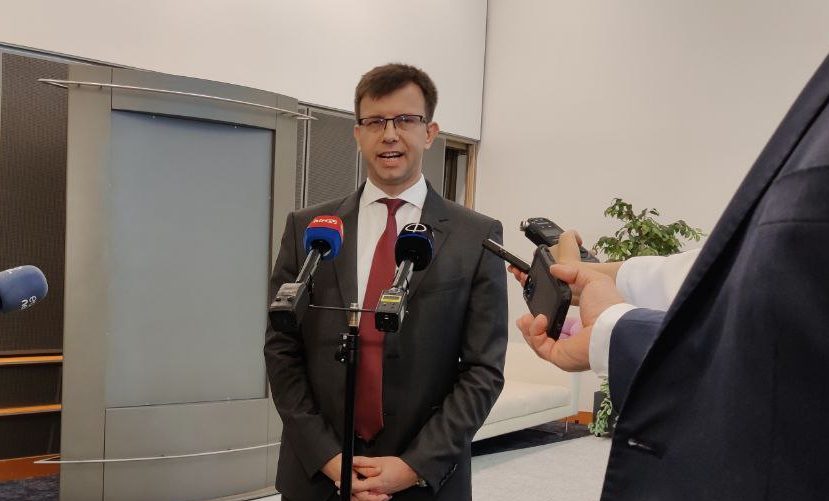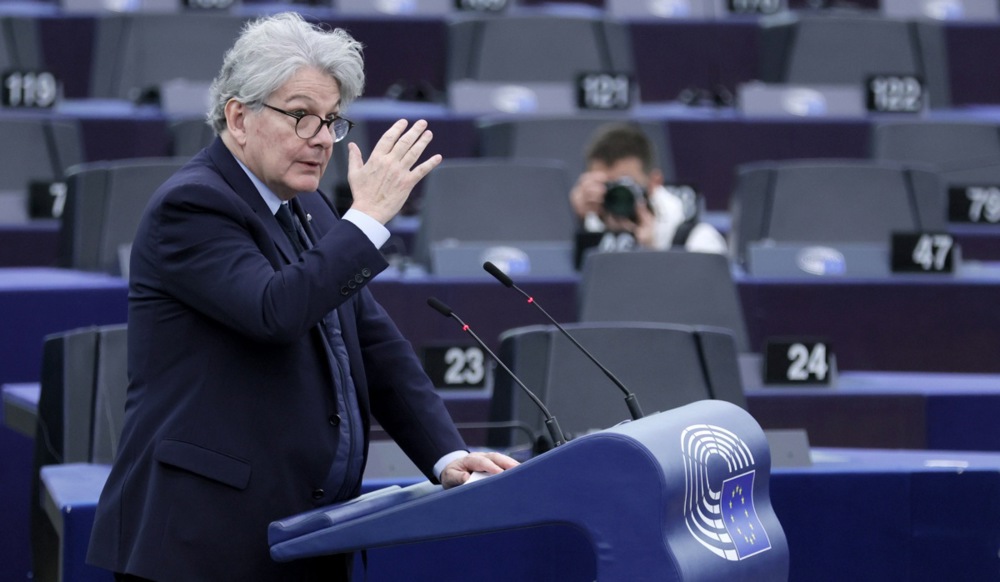Tensions were running high in the European Parliament in Strasbourg on the morning of October 9, with the EU’s top bureaucrats and politicians turning on Hungary as it tried to present its plan for the EU presidency.
Leading the charge was Commission President Ursula von der Leyen, who publicly blasted Hungarian Prime Minister Viktor Orbán over his push to protect the EU’s external borders.
“You said that Hungary is ‘protecting its borders’, and that ‘criminals are being locked up’ in Hungary. I just wonder how this statement fits with the fact that last year your authorities released from prison convicted smugglers and traffickers before they did their time,” she railed.
“This is not fighting illegal migration in Europe. This is not protecting our Union. This is just throwing problems over your neighbour’s fence.”
Joining the dogpile was the Socialists and Democrats (S&D) group, who attacked Orbán’s government over its alleged “rule of law” violations.
“Mr Orbán, your main contribution to the European Union since you came to power in 2010 has been the formation of a new far-right group – the false patriots. And you have used your false patriotism to demolish democracy, thrive in corruption and violate the rights of those who do not think like you,” group leader Iratxe García Pérez said in the chamber.
Renew politician Gerben-Jan Gerbrandy even tried to link Orbán to the controversial ‘Project 2025’ plan. Written by the Heritage Foundation think-tank, the plan was drawn up in 2022 as a potential roadmap for a future Trump administration in the United States to revamp the country’s civil service.
The document has nothing to do with the European Union.
Hungary’s chief prosecutor has asked the president of the European Parliament to suspend the parliamentary immunity of Prime Minister Orbán’s main political rival, MEP Péter Magyar. https://t.co/IJN7AGhp0x
— Brussels Signal (@brusselssignal) September 27, 2024
The attacks on the Hungarians were not limited to the plenary itself. Outside the chamber, German Green MEP Daniel Freund has helped set up an exhibition branding the Orbán government as being corrupt.
Even online, those working in the parliament could not escape the eurocrat attacks on Hungary.
In an email sent around the parliament on October 8 seen by Brussels Signal Péter Magyar, the lead Hungarian MEP for the European People’s Party, accused the Orbán government of targeting him using “Fidesz-controlled media outlets”.
He added that Orbán and his government colleagues were afraid of losing their “stolen wealth”, citing such fears as the reason the country has requested his immunity be lifted over accusations of lawbreaking in Hungary.
“Orban’s oligarchs will go to jail sooner than I will,” he claimed, accusing the Hungarian government of “turning Hungary into the poorest and most corrupt Member State of the European Union”.
Hungarian Prime Minister Viktor Orbán is scheduled to address the European Parliament in Strasbourg next week amid attempts by opponents to prevent him from coming. https://t.co/2pOxtyCbAz
— Brussels Signal (@brusselssignal) September 12, 2024
Allegations of Hungarian corruption within the eurobubble are nothing new, with such accusations spiked in recent years amid Hungarian attempts to reject Brussels-backed policies on climate, migration, LGBTQ ideology and the Ukraine war.
Many opponents of Budapest have recently cited the example of a “forest canopy walkway” in the country as an example of the various rule of law issues Hungary faces.
The construction, which cost around €160,000, was meant to give the public a treeline view of a forest outside the town of Nyirmartonfalva. Instead, it appears to give visitors a view of a field of saplings that have yet to grow.
While the walkway has since become a pilgrimage spot for those looking to highlight corruption issues in the country, many of Hungary’s detractors within the Brussels bubble have their own scandals to contend with.
García Pérez’s S&D group, for example, has been the centre of numerous corruption scandals in recent years, the most notable example of which being ‘Qatargate’, which saw a number of senior figures within the party arrested over the scandal.
Von der Leyen meanwhile has to contend with Pfizergate, a scandal revolving around her Commission’s mishandling of the COVID-era vaccine procurement negotiations with American pharma giant Pfizer.
The European Commission president is said to have negotiated part of the agreement over text with the company’s CEO Albert Bourla, with the commission having since refused to release the text messages under freedom of information rules, claiming they had accidentally deleted them.
Outgoing EU Ombudsman Emily O’Reilly took the body to task over the scandal in 2022, branding its decision to not release the text messages as “maladministration”. A New York Times legal case against the Commission over the incident is set to be heard in the European courts next month.
The Strasbourg dogpile was expected, with Orbán even opting to hold a separate press conference on Hungary’s plan for its EU Presidency on October 8 for the EU’s media.
Speaking on why he was holding a separate press conference the day before he presented the plans to the European Parliament, Orbán said that he expected the presentation to be derailed in the chamber by parliamentarians and bureaucrats looking to speak on other issues to do with the country.
NEWS OF THE DAY: Orbán’s ‘peace trips’ annoy Brussels leaders.
Read the full article ??https://t.co/7HEYy94QPw pic.twitter.com/TTRscBe3Sh
— Brussels Signal (@brusselssignal) July 8, 2024





